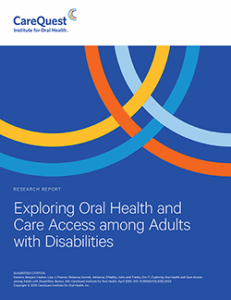Many adults living with disabilities face considerable challenges to accessing necessary oral health care, according to findings from CareQuest Institute’s most recent State of Oral Health Equity in America (SOHEA) survey.
More than one in four adults in the United States has at least one type of disability — and adults with disabilities are more likely to have worse oral health outcomes, such as untreated dental decay, missing teeth, and delayed care.
Key findings include:
- One quarter of adults with a disability (25%) said they delayed care, missed an appointment, or were unable to obtain needed health care, including oral health care.
- Nearly a third of adults reporting a disability (30.2%) said that the dental office where they receive care does not provide them with special help and/or accommodations for their dental visit.
- Adults with a disability have significantly higher odds of having visited a hospital emergency department for dental care.
These findings highlight the importance of addressing social determinants of health — such as transportation options and accessible dental offices — that disproportionately affect individuals with disabilities.
To improve access to oral health care for individuals with disabilities, the authors recommend:
enhancing Medicare and Medicaid coverage for adult dental care, additional training for providers in the treatment of individuals with disabilities, and integrating medical and dental care with specialty oral health care.”
You may also be interested in:
- Caring for Individuals with Disabilities: Practical Considerations for Dental Providers, a self-paced course that explores different types of disabilities and ways for providers to improve access to care for individuals with disabilities. Eligible for 1 CE credit.
- Providing Equitable Care to Special Populations in North Carolina, a blog describing how one dental practice has found innovative ways to successfully deliver dental care to patients with disabilities.
- How a Pilot Program Is Transforming Dental Care for Patients with Disabilities, an article in Decisions in Dentistry shares how a new pilot program at Tufts Dental Facilities is breaking barriers with home visits and telehealth to make dental care more accessible.

